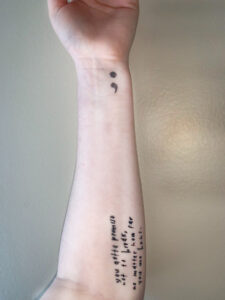Stories Behind the Semicolon
Story by Sarah Sabatke
Punctuation marks seldom capture the imagination. They are function, not form. So when someone tattooos a semicolon on their body, it often prompts a question.
That question — and the conversation that often follows — is the intent behind Project Semicolon. The organization is dedicated to reducing suicide worldwide by promoting greater community and greater access to information and resources.
Project Semicolon uses the punctuation mark as a metaphor. In writing, authors use semicolons when they could have ended a sentence, but they chose not to. In life, every person is their own author; the semicolon reminds them that they don’t have to end their own sentence.
Individuals around the world have gotten semicolon tattoos to represent their own experiences with mental illness or to support others who are struggling.
On Mizzou’s campus, students say the tattoo is much more than a mere trend.
Erin

Mental health has long been a part of Erin’s life. She was diagnosed with anxiety at age 8 and says, “Things just added on from there.
“I knew I was strong willed and could learn to live with these things and still conquer the day in order to live the happiest life possible even through the struggles,” she says. The junior psychology major from Kearney, Missouri, chose her major with the goal of helping people, just as her own therapist has helped her.
At age 17, she visited a tattoo shop in the Kansas City area. She wanted something to act as a reminder that her mental health struggles do not define her and that “[her] story continues regardless.” She left with a small semicolon tattooed on her wrist.
I chose my left wrist so that I can see it at all times throughout the day if I want to or when I just need a reminder that I can keep moving forward,” Erin says.
“I got this tattoo in one of my darkest times, and truly the tattoo saved my life because every time I caught a glimpse I knew I couldn’t give up.”
Erin advocates for mental health and says she feels that it is part of her “life’s purpose” to help fight the stigma of mental illness, even if that means sharing her own story.
“I can’t wait until the day our society is more accepting of mental health and understanding — until that day, I will continue to openly share my story,” she says. “That is truly why the semicolon is more than just a punctuation mark to me.”
Darcy

Darcy, a Mizzou junior, got a semicolon tattooed on her left wrist, as did Erin.
The Washington, Missouri, native is double-majoring in statistics and political science.
“I am a sucker for statistics; it’s a mix of math and English, and I love understanding the equations behind it,” she says.
When her hometown tattoo parlor created a fundraiser for a local mental health facility, Darcy decided it was time to get her own tattoo. Below the semicolon, Darcy has lyrics from “Rhode Island,” a song by The Front Bottoms. The lyrics read, “You gotta promise not to break, no matter how far you are bent.”
“It’s a constant reminder to keep going,” she says. “Having mine unites me to other people when I see theirs because it indirectly says we chose to not end the sentence — our lives — by placing a semi-colon there versus a period.”
Darcy says her tattoo reminds her that, even though there will still be bad days, there will be good days, too.
“Having borderline personality and bipolar disorders always has me swinging in different directions, and it can be extremely hard to manage,” Darcy says. “I share my story because I want others to know their mental health matters just as much as their physical health, that it’s OK to ask for help, and that they, too, can share their story.”
Amanda

Amanda contemplated getting a semicolon tattoo long before her 18th birthday. She placed the small, black semicolon on the inside of her left wrist.
The senior psychology major from Milwaukee said the punctuation mark resonated with her because she loved to read but also because of its mental health connection. During her junior year of high school, Amanda’s boyfriend died by suicide. She said her tattoo turned into more of a symbol of solidarity against suicide.
“I think it’s a reminder that you can pause wherever you are in life,” Amanda says. “Nothing has to end for you to just step away and take a break.”
Amanda is the chapter president of College Mentors for Kids, a student organization that works with low-income students in the Columbia community to mentor them on topics related to community service, higher education and diversity. She said the organization has helped her find a community on campus.
“I think being in a student organization like College Mentors, especially one that’s heavily run by students, has been a huge part of just having joy and making friends and wanting to be part of a community and not shutting yourself out,” she says.
After her boyfriend’s suicide, Amanda began to advocate for prevention and to fight against the stigma surrounding mental health. That advocacy led her to study psychology at Mizzou.
“Mental health affects everybody, and even people who feel like they don’t suffer any type of mental health [issues], that’s just not a correct thing to think,” Amanda says. “That’s part of your body; that is your health.”
KateLynn

KateLynn’s semicolon tattoo is attached to a butterfly, representing the butterfly project.
“The butterfly project is usually for people who struggle with self harm. They often draw a butterfly on them and name it after someone — if they end up cutting, then they killed the butterfly,” KateLynn explains. She got a butterfly tattoo to represent her struggles with self harm and added a date to represent the day she quit. Her semicolon makes up the center of the butterfly.
KateLynn came from Monroe City, Missouri, to study science and agriculture journalism at Mizzou. She says walking through Mizzou’s botanic gardens and resources such as the MU Counseling Center and MizzouRec have helped her cope during her time on campus.
“I’m in a better place now than what I used to be, so I’m more OK with talking to people about it, and people need to be more aware of mental health because it does have a negative stigma with it.”
Though it might seem best to try to talk someone out of suicide, KateLynn encourages people to guide their friends towards professional help. More than anything, she hopes people will follow the semicolon’s lead; take a pause and just listen.